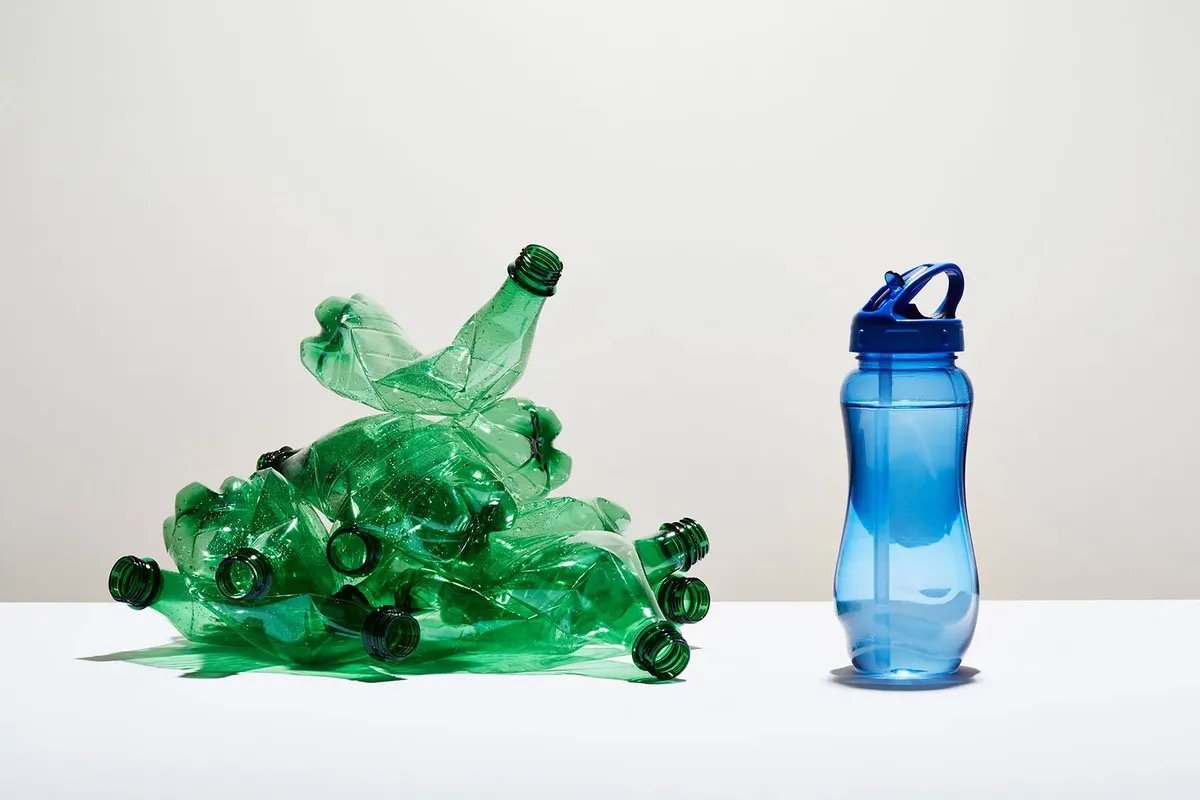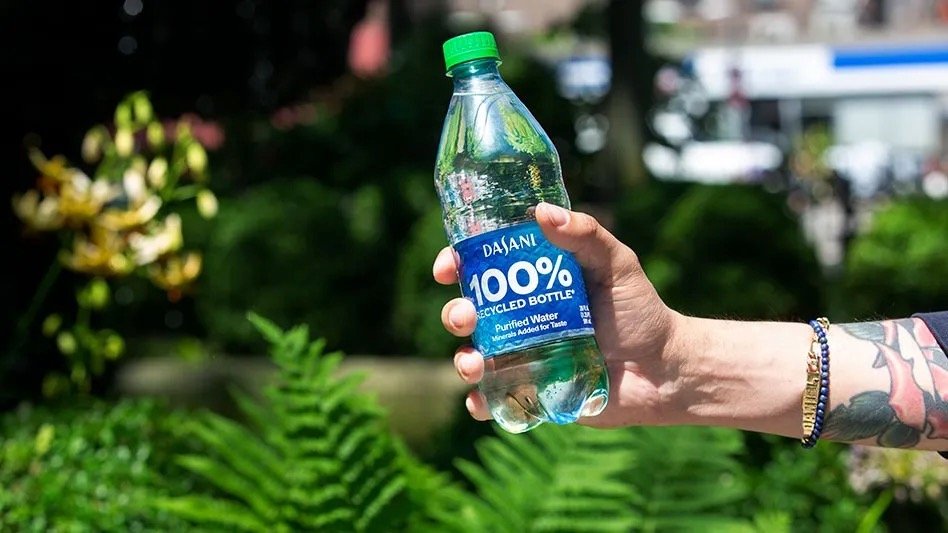Uncover Omaha's Recycling Secrets: Debunking Common Myths
We do a lot of presentations and field a lot of questions about recycling and composting. There’s a handful of questions or misconceptions we come across frequently. So we put together this list to clear the air. Read this and you’ll be among the top 1% of recycling know-it-alls. 😊
Omaha Recycling Myth 1:
“Leave the caps off.”
Your city is either a “cap on” or a “cap off” place. Omaha is a “cap on” kind of town.
Plastic lids and caps, including spray-top and pump-top lids (that are attached to a recyclable item), can be placed in a curbside recycling cart or drop-off container.
Lids cannot be accepted by themselves. As we said above, because of its small size and shape, single lids often fall through the sorting equipment. They may go to the landfill if not attached to their original container.
Omaha Recycling Myth 2:
“It’s okay I drink from water bottles because I recycle them.”
Recycling is great (and necessary), but the real magic happens when you avoid creating waste in the first place.
That’s because it takes a whole lot of energy and resources to create, ship, and recycle single-use products. You can avoid wasting all of that extra effort just by refilling a reusable bottle.
Anytime you use a reusable item (like a coffee mug) over single-use (like a paper coffee cup) — you’ve won.
Omaha Recycling Myth 3:
“Plastics with the arrows mean they are recyclable.”
Yeah … no.
Here’s the truth: That number in the center of the chasing arrows merely communicates the type of plastic resin. Whether it’s recyclable or not is technically unrelated. It all depends on what types of resins your local recycling facility accepts.
But no worries, we created a “Get to Know Your Plastics Guide.”
But here’s a quick summary: plastics 1, 2, and 5 are great to recycle. Any other type should probably go in the Hefty RenewBag. Or, landfill it.
Omaha Recycling Myth 4:
“Biodegradable items are compostable and/or better for the environment.”
The term “biodegradable” comes across as eco-friendly, but we loathe it.
What does it even mean? … We’re not even sure. It depends on a case-by-case basis. That makes these products ripe for confusion and marketing exploitation. So, we suggest avoiding it in most scenarios.
In its true sense, biodegradable means the item will break down faster than its conventional option. As in, “This plastic cup breaks down in 1 year versus 1,000.” But it needs humidity, air, and microorganisms to do that. A landfill isn’t an ideal setting for this. And there could be pollutants and heavy metals left behind.
Also, people often confuse compostable with biodegradable. The two are not necessarily the same. All compostable items are biodegradable, but not all biodegradable products are compostable. If you’re trying to compost a single-use item, it must be BPI certified.
If the item needs to be single-use, it’s better to get something you know is easily recyclable. That’s because access to recycling is more common. If you have access to industrial composting, BPI-certified items are great as well. Bu as always, resusables are always better than single-use products.
Omaha Recycling Myth 5:
Confusion between “recyclable” and “recycled” products.
“Recyclable” means that the item has the potential to be recycled, but it does not guarantee that it will be recycled. “Recycled” products are made from materials that have already been recycled, as opposed to new virgin materials.
Choosing products made from recycled materials helps create a demand for the materials collected in recycling programs, which also helps conserve our natural resources, protect the environment, save money, and reduce the need to develop additional disposal capacity (in landfills).
Omaha Recycling Myth 6:
“I can recycle this even with liquid in the bottle.”
No one wants to recycle your soggy cardboard.
Leaving liquid inside a container reduces the recycling rates of other materials. Emptying the container before recycling ensures efficient and uncontaminated recycling. Residue is fine. Just try to avoid any drinkable amount of liquid.
Omaha Recycling Myth 7:
“You have to remove the plastic insert in mail.”
First of all, here’s how to unsubscribe to junk mail.
Secondly, the envelopes with see-through plastic windows are okay to leave intact. Printed, glossy, soft-cover magazines are okay (discard if the cover has a waxy-feel coating). Do not include paper with metallic or glitter embellishments (keep those for your vision boards). Do not bag items in recycling carts.
Omaha Recycling Myth 8:
“No item is too small to be recycled.”
The general rule is that anything smaller than a credit card or thumb is problematic for recycling. That’s because the item may fall through the sorting equipment. When that happens, it’s swept into a big pile and tossed into the landfill.
For example, individual business cards are often too small to be recycled. However, if you have a stack of them, we recommend placing that inside a larger envelope to make it easier to capture.
Bonus: Digital business cards are an eco-friendly way to network. Check out Popl.
Omaha Recycling Myth 9:
“Foil-lined items can’t be put in Hefty RenewBags.”
We’re also a “foil on” kind of town.
If you jump online to see if foil-lined plastics can go into the Hefty RenewBag, you’ll probably read that they are not accepted.
However, because you’re amazing and live in Omaha (and those items are being processed locally at First Star), you can RenewBag your foil-lined items.
But why does it say otherwise online or on packaging? That’s because most other cities send their RenewBags to facilities that break down the products in a different way than Omaha does. Those other facilities don’t want the silver/foil-lining.
Note, this is not to be confused with aluminum foil, which is a metal and belongs in the landfill (sorry!).
So put potato chip bags and other silver-lined plastics in the orange bag.
To sum it up …
Remember, recycling is just one piece of the puzzle.
To make a significant impact, we should focus on waste reduction, responsible consumption, and choosing sustainable alternatives whenever possible. Together, we can create a cleaner and greener future for future generations.
Feelin’ fired up? Ready to recycle? Luckily for you, we offer education & consultation services to help commercial businesses start recycling programs. Contact us for more information today!








